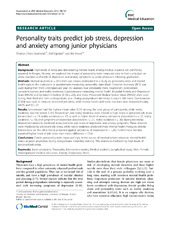| dc.description.abstract | Background: High levels of stress and deteriorating mental health among medical students are commonly reported. In Bergen, Norway, we explored the impact of personality traits measured early in their curriculum on stress reactions and levels of depression and anxiety symptoms as junior physicians following graduation. Methods: Medical students (n = 201) from two classes participated in a study on personality traits and mental health early in the curriculum. A questionnaire measuring personality traits (Basic Character Inventory (BCI)) was used during their third undergraduate year. BCI assesses four personality traits: neuroticism, extroversion, conscientiousness and reality weakness. Questionnaires measuring mental health (Hospital Anxiety and Depression Scale (HADS) and Symptom Checklist 25 (SCL-25)), and stress (Perceived Medical School Stress (PMSS)) were used during their third and sixth undergraduate year. During postgraduate internship, Cooper’s Job Stress Questionnaire (CJSQ) was used to measure perceived job stress, while mental health and stress reactions were reassessed using HADS and SCL-25. Results: Extroversion had the highest mean value (5.11) among the total group of participants, while reality weakness had the lowest (1.51). Neuroticism and reality weakness were related to high levels of perceived job stress (neuroticism r = .19, reality weakness r = .17) as well as higher levels of anxiety symptoms (neuroticism r = .23, reality weakness r = .33) and symptoms of depression (neuroticism r = .21, reality weakness r = .36) during internship. Neuroticism indirectly predicted stress reactions and levels of depression and anxiety symptoms. These relations were mediated by perceived job stress, while reality weakness predicted these mental health measures directly. Extroversion, on the other hand, protected against symptoms of depression (r = −.20). Furthermore, females reported higher levels of job stress than males (difference = 7.52). Conclusions: Certain personality traits measured early in the course of medical school relates to mental health status as junior physicians during postgraduate internship training. This relation is mediated by high levels of perceived job stress. | en_US |

